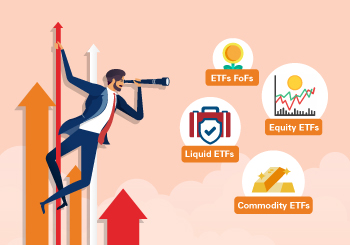Have you ever wondered why ETFs are considered a type of mutual fund, even though they are quite different from each other? This blog will help you understand the reason for the same. We will also help you know some of the major similarities and differences between mutual funds and ETFs. This will help you understand why ETFs may be a good choice for you.
Many investors are quite hesitant to invest in ETFs even though they have enough experience in investing in mutual funds. This is because they are of the misconception that ETFs are subject to market volatility. If you have been thinking of the same, please be informed that ETFs, if managed properly, could prove to be a profitable investment option.
ETFs vs. Mutual Funds
ETFs and Mutual Funds are quite similar in that they offer diversification for investors by investing in different instruments like equity, debt and commodity. However, the main difference between these two is how they operate. While you can buy or sell mutual funds at their net asset value at the end of each trading day, you can trade in ETFs throughout the day, just like how you deal with stocks. Certain mutual funds are actively managed, as fund managers decide about the asset allocations in the respective funds. On the other hand, ETFs are passively managed, and their values rise or fall depending on the stock exchange index that they are mimicking.
Key Differences between ETFs and Mutual Funds
Though the core concept of investing in a basket of securities for portfolio diversification is the same for ETFs and mutual funds, there are some key differences between these two categories. They are:
- We already explained how you could buy or sell mutual funds and ETFs in the above section. Unlike mutual funds, ETFs can be bought and sold throughout the day.
- Since mutual funds are actively managed by professional fund managers, they come with higher expense ratios and fund management fees. ETFs have lower expense ratios because they are passively managed.
- The portfolio of mutual funds depends on the objective of the respective scheme and fund manager decides to buy or sell aiming to meet the objective and also following the guidelines. So, mutual funds can choose equity or debt or a mixture of both to meet their objectives. ETFs, on the other hand, mimic the performance of a particular index on the stock exchange.
- Mutual funds offer more flexibility to investors than ETFs. As mutual funds are actively managed, the fund manager can alter the asset allocation based on market conditions with the aim to minimise risk and maximise returns. However, with ETFs, that’s not possible, because the performance of an ETF (whether high or low) purely depends on the performance of its underlying index.
Despite these huge differences, ETFs are still classified as an asset class under mutual funds. To understand more about this point, it would be good to know what an asset class means and its types.
Asset class and its types
Asset class, in simple terms, is the class or type of investment that one decides to choose. While choosing mutual funds for investment, you will come across different asset classes. You can choose the one that suits your risk appetite and financial goals the best. Some of the common asset classes that you will find under mutual funds are:
- Cash - Here, funds are invested in commercial paper and other money market instruments with quick liquidity
- Equity – Here, funds are invested in equity or equity-related instruments of companies
- Real Estate – In this asset class, investors get to invest only in the real estate sector
- Gold – Here, investors can choose commodities like gold, silver, etc.
- Bonds – Great for people who have a low-risk appetite, this asset class invests in fixed income instruments like bonds, government securities, debentures, etc.
ETFs are of many types. Some of the common types of ETFs are equity ETFs, debt ETFs and commodity ETFs. As an investor, when you are looking for an equity-focused portfolio for your mutual funds, you will be given the option between choosing equity-oriented funds and equity-oriented ETFs. This is only an example. So, though the way they operate is very different from each other, ETFs are still a subset of mutual funds.
An investor education initiative.
Visit www.icicipruamc.com/note to know more about the process to complete a one-time Know Your Customer (KYC) requirement to invest in Mutual Funds. Investors should only deal with registered Mutual Funds, details of which can be verified on the SEBI website (www.sebi.gov.in/intermediaries.html). For any queries, complaints & grievance redressal, investors may reach out to the AMCs and / or Investor Relations Officers. Additionally, investors may also lodge complaints on https://scores.gov.in if they are unsatisfied with the resolutions given by AMCs. SCORES portal facilitates you to lodge your complaint online with SEBI and subsequently view its status.
Mutual Fund investments are subject to market risks, read all scheme related documents carefully
![]()
![]()
![]()
![]()












.jpg?sfvrsn=400d5aea_0)









